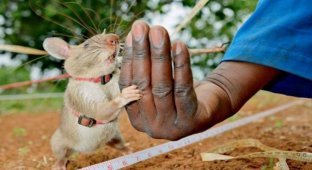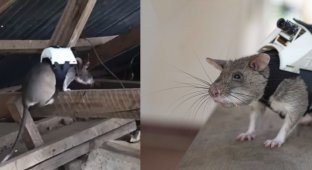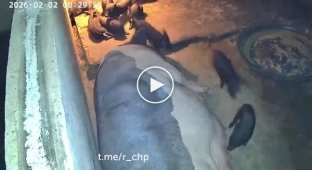A Gambian rat saved people's lives and received a gold medal (8 photo)
Many animal lovers keep decorative rats at home. They are smart, love to communicate with their owner, are easily trained to do all sorts of interesting tricks, and even willingly participate in photo shoots. But domesticated rats have a more important "job." 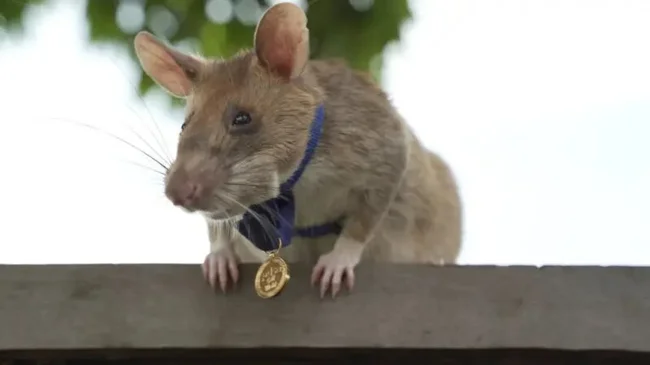
There are twice as many rats on Earth as people
They are specially bred for science - in laboratories. Thanks to rats and their participation in research and experiments, scientists learn a lot of new things. And since the end of the last century, animals have been used to save human lives. But can a rat deserve a real gold medal - we will talk about this today.
Rats have "shone" not only in science, but also in the entertainment industry. In 2019, trained rats, to the delight of children, entered the circus arena. It was the Diamond Circus - also known as the State Circus of the Republic of Sakha (Yakutia). They played in an episode of the New Year's circus production - the artists staged "The Nutcracker". Remember, in this fairy tale there was the Rat King and his subjects? After the performance, the tailed "artists" were presented to the little viewers (with the permission of their parents, of course).
Specialists from the Animal Art agency, which organizes filming with animals, also work with rats. Directors often involve rats to create a gloomy atmosphere in episodes where these small rodents may be present. Movie rats “live” in various dark places — they inhabit prisons, run through dungeons, and leave the decks of sinking ships. 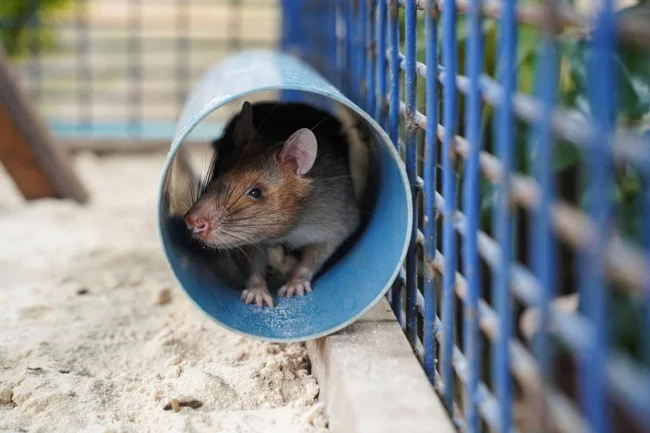
Rats live in packs, and decorative rats should not be kept alone either
But animals are not given honorary awards for friendship with humans, participation in laboratory research, and filming. What did the rat do to deserve such a high distinction?
For almost 3 decades of military conflicts, Cambodia, a country in Southeast Asia, has turned into a minefield: from 1975 to 1998, from 4 to 6 million landmines appeared on its soil. The number of victims of past wars is off the charts: 64 thousand people. This is really scary. People are afraid to take a step on their native land, because this step may be the last. 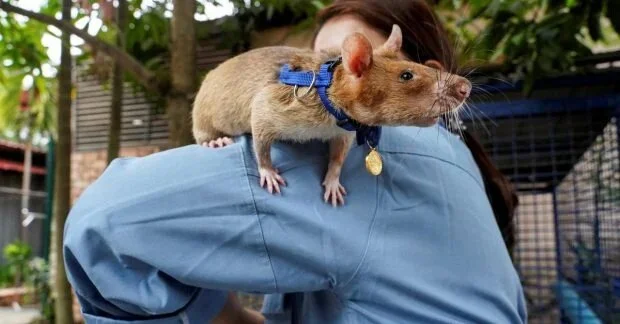
Rats are smart and easy to train
In 1997, the charity Anti-Persoonsmijnen Ontmijnende Product Ontwikkeling (APOPO) was founded in Belgium. The organization's name translates as "Development of anti-personnel mine detection products." It was invented by Belgian Bart Uitjens, who had kept rodents since childhood and knew about their intelligence and easy learning ability. This man was horrified by the statistics of numerous deaths and crippling injuries caused by mines. He decided that together with rodents he could help the inhabitants of "mined" countries. 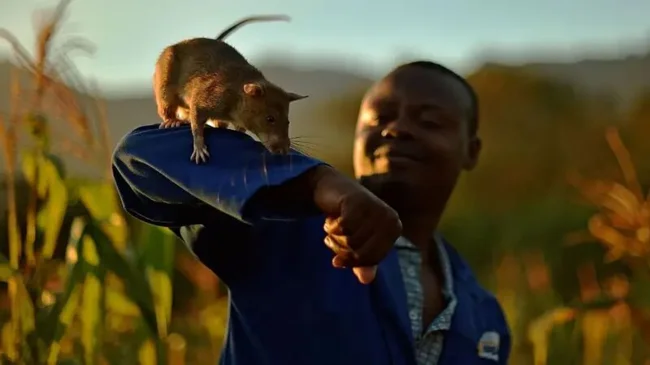
Rats bring food to sick and weak relatives, saving their lives
A local African species of animal, the Gambian marsupial rat, was chosen for mine detection training. These are the largest representatives of the mouse-like animals - rats grow up to 90 cm in length and weigh from 1 to 1.5 kilograms. But they are still too light to be blown up by a mine designed for a person. So for them, mine searches are much safer than for human sappers and dogs. And they work faster than both their two-legged and four-legged "colleagues". Gambian rats have very poor vision, but their hearing and, most importantly, their sense of smell are well developed - their nose helps them find mines. 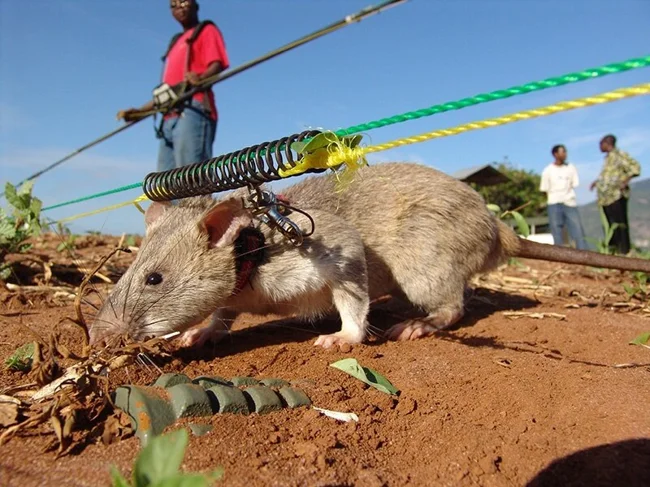
A rat can jump 2 meters high
Training a bomb disposal dog costs $25,000, while training a rat costs only $7,000.
The project called HeroRAT was launched in 1997. Today, the project's training center is located in Tanzania. Animals are trained from the age of one month. They are socialized and accustomed to people at home, taught to walk on a harness and search for samples of TNT camouflaged by the soil - already in the field. 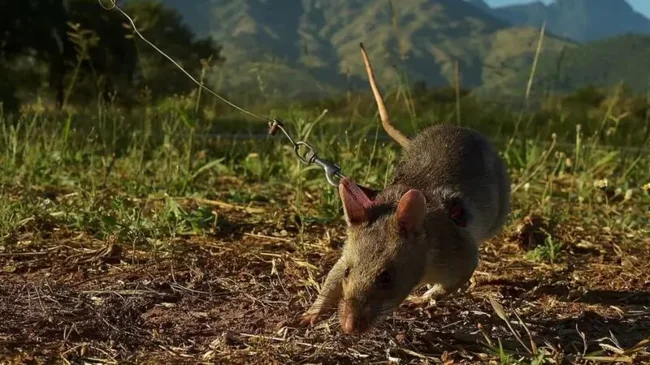
Rat pulse - 500 beats per minute
Training lasts 7 months, then the animal passes a difficult "exam", receives a certificate and starts working. Today, the achievements of the rats participating in the project are impressive: more than 4,000 mines, 2,000 bombs and other unexploded ordnance, and more than 14,000 cartridges have been found. The trained rodents, weighing at most one and a half kilograms, really save lives and protect people's health.
On September 25, 2020, the British charity The People's Dispensary for Sick Animals (PDSA) awarded a gold medal to a rat for the first time in its history. Usually, this honorary award — For animal gallantry or devotion to duty — is given to dogs and horses serving in the army or police. 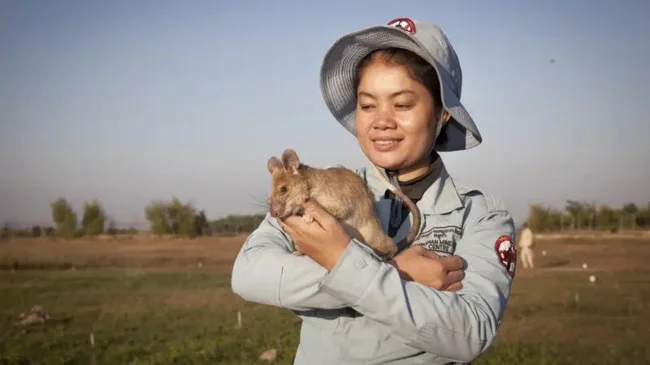
Due to the lack of fear of heights, rats often fall and crash
Rats can be military too. The award was given to a demining rat named Magawa, trained as part of the HeroRAT project. The medal, of course, matches the size of the recipient — miniature, but quite real!
Magawa is the pride of the project: this male Gambian rat was born in a laboratory in 2013, trained and started working in 2016. Over 5 years (2016-2021), Magawa checked more than 22.5 hectares (225,000 m²) of land in Cambodia. The hero rat found 71 mines and 38 other munitions - all of which threatened people with death or disability. 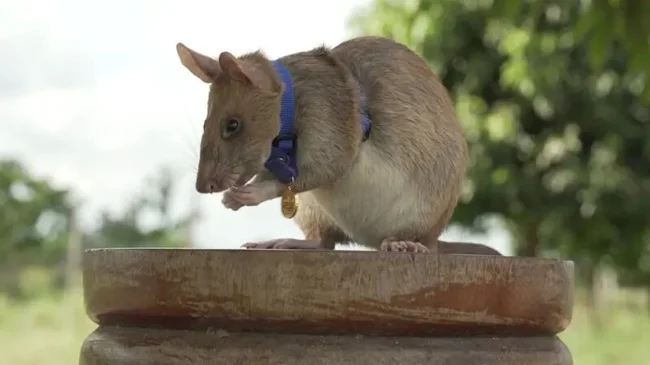
A rat can live longer without water than any other animal on Earth
Hero rat Magawa passed away in Cambodia at the age of eight. The animal was looking for explosives left over from the civil war. Magawa became the first rat to receive such a medal. In total, it was awarded to 30 different animals.
According to APOPO, today there are more than 50 “mined” countries in the world, and the lives of more than 60 million people are still in danger from unexploded ordnance. But hero rats continue to work: today they are surveying the lands of Cambodia, Mozambique, Angola and Thailand, meter by meter.












